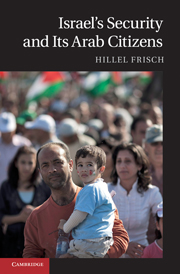Book contents
- Frontmatter
- Contents
- Figures and Tables
- Note on Transliteration and Translation from Arabic
- Acknowledgments
- Acronyms
- 1 Israel and Its Arab Citizens
- 2 Israel’s Security Profile and State–Minority Relations
- 3 State Policies toward Israel’s Palestinians
- 4 The Domestic Politics of Israel’s Arab Citizens
- 5 Extraparliamentary Organizations, Patterns of Protest, and Terrorism
- 6 Israeli Arab Identity – Commemorating the Nakba
- 7 The PLO, the PA, and Israel’s Arab Citizens
- 8 Identifying with the Enemy
- 9 Israeli Arab Political Demands and Israeli Security
- Conclusion
- References
- Index
6 - Israeli Arab Identity – Commemorating the Nakba
Published online by Cambridge University Press: 05 November 2011
- Frontmatter
- Contents
- Figures and Tables
- Note on Transliteration and Translation from Arabic
- Acknowledgments
- Acronyms
- 1 Israel and Its Arab Citizens
- 2 Israel’s Security Profile and State–Minority Relations
- 3 State Policies toward Israel’s Palestinians
- 4 The Domestic Politics of Israel’s Arab Citizens
- 5 Extraparliamentary Organizations, Patterns of Protest, and Terrorism
- 6 Israeli Arab Identity – Commemorating the Nakba
- 7 The PLO, the PA, and Israel’s Arab Citizens
- 8 Identifying with the Enemy
- 9 Israeli Arab Political Demands and Israeli Security
- Conclusion
- References
- Index
Summary
Ted Gurr included the Arab citizens of Israel in his seminal book, Minorities at Risk (Gurr 1993). In the minds of many Jewish Israelis, however, they are a majority that feels its own existence is at risk. This predicament where the majority within a state is a minority regionally exists elsewhere (in northern Ireland, for example). As was discussed previously, the relationship between Israel’s bi-national reality and security/insecurity (often overlooked in today’s fashionable postmodern discourse on identity), which treats ethnic problems as a normative issue confined to the domestic arena, has generated one of the most intense and protracted debates in Israeli Jewish academic circles regarding the one-million-strong Arab minority in its midst. It posed the question whether Israeli Arabs were politicizing – improving their lot through participation in Israeli politics to ensure greater equality in the allocation of resources but otherwise accepting what Amos Oz described as the “iron-wall” of the Jewish state, or radicalizing – developing opposition towards the state by linking up with outside forces of Palestinian nationalism and thus posing a potentially secessionist threat
The question this chapter poses is whether this greater participation in Israeli society and politics at the expense of direct involvement in the liberation and state-building Palestinian national enterprises, has moved upstream from political behavior to identity issues. Israel’s celebration of its fiftieth year in 1998 and the commemoration of the Nakba it engendered, presented an opportunity to compare the way Arabs in Israel commemorated and narrated the Nakba, with the way they it is commemorated in the PA across the Green Line.
- Type
- Chapter
- Information
- Israel's Security and Its Arab Citizens , pp. 114 - 126Publisher: Cambridge University PressPrint publication year: 2011



